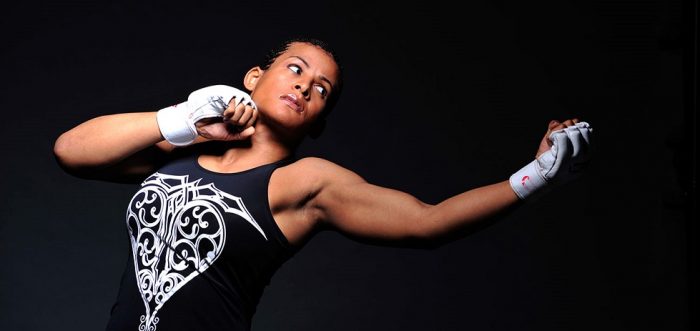Game Face is a timely and touching documentary whose intimate access to its compelling subjects is probably its strongest asset. First-time feature director Michiel Thomas documents the coming-out experiences of two US LGBTIQ+ athletes: Fallon Fox, the first openly transwoman MMA fighter; and Terrence Clemens, an aspiring college basketball player who just so happens to be gay. Thomas approaches these stories with a delicacy and assurance which mostly transcends the heavy-handedness and overwrought sentimentality of his sound and editing choices. What it lacks in subtlety it makes up for in the remarkable insight it offers to the minutiae of the athletes’ personal and professional lives as these overlap, increasingly, with one of the most highly visible and heavily scrutinised narratives of our cultural moment; it also shows us how they cope.
We are first introduced to the resilient Fallon Fox. Fox’s story is one of hardship, endurance and of basically being as tough as all get-out; we learn of her experiences with mental illness, and of her own mother’s rejection of her – Fox, voice trembling, says she would have her “burning in hell for all eternity.” Her outing is troublingly non-consensual and comes early on in the piece, while the remainder the film deals with the tumultuous fallout and her stoic tenacity in dealing with it. Shortly after Fox is introduced we meet the articulate though reserved Terrence Clemens, a former high-school basketball talent, whose teammate’s discovery of his burgeoning sexuality resulted in him being ostracised. After spending time in prison, he manages to earn a college basketball scholarship for Northeastern Oklahoma A&M College (no small feat), in a religious little backwater town in Oklahoma, where we see him yearn to reveal his true identity.
Thomas contrasts the pair’s journeys, allowing us to compare and to find symmetries between the two, and often uses their own testimony to challenge what we may assume we know about their lives and livelihoods through constant media scrutiny. If you’re not a super-duper big-time sports or fighting fan (or if you’re even a big ol’ couch potato like me) the film does its best to imbue each sports sequence with an emotional resonance; book-ending these with private, intimate monologues: Clemens, upon deciding he does want to come out, stresses that he simply has no direction, no map to follow to do so: “Sometimes I have a plan to come out as gay, but then I get nervous. I just don’t know where to start.” The film oscillates effortlessly between the two stories, adding texture, and depth to our understanding of their lives.
This layered approach also works to strengthen the inclusive message of the film: media coverage containing trans-exclusive ideology spouted by competitors and pundits (including particularly vicious, albeit unsurprising misgendering from Hulk Hogan) is calmly and assuredly dismantled by the testimony of sports scientists, and biologists, and finally by Fallon herself. The treatment Fox receives from her opponents, portrayed in such a quick, relentless barrage, removes any nuance or excuse which might cloak it, leaving the hypocrisy, contradiction, and bigotry that motivate these in stark and unambiguous relief, such as when an opponent, Ashlee Evans-Smith congratulates her after a match before, the very next day, telling a camera crew that trans athletes should have a segregated competition. Fox is always understanding, never angry, but her frustration ekes out through her stoic but increasingly exhausted countenance: in a particularly vulnerable scene she laments her loss of anonymity as a trans fighter: “I liked being perceived to be just like anyone else”.
Admittedly, there are some somewhat dodgy #inspiring soundtrack and footage pairings throughout: sappy guitar strums over Rocky-esque training montages with Fox; hokey imagery of Clemens running up mountains in slow-mo (which could very easily be off-cut footage from a Nike ad) is made even more mawkish when it develops into extended shots of him staring, wistfully, through barbed wire (symbolism!). There were even a couple of moments where I started to notice the artifice of the story’s sequencing: you might wonder if Clemens’s coming-out may have been staged so publicly and formally, at a meeting post-season, for the benefit the cameras more than for him – playing perhaps a little too directly to us.
Really, though, the film is at its most affecting when restraint is used in portraying personal moments and exchanges, especially between allows for the authenticity of these athletes’ experience to ring out: conversations between Terrence and NBA’s first “out” basketballer, the retired Jason Collins, who gives him tips on coping with homophobia are humorous though saddening; Fox’s exchanges with trans NCAA D1 basketball player Kye Allums contain under-represented and scintillating knowledge; we see their shared exasperation at the lack of understanding they face, everyday, as Allums says “all people should think when I tell them that I’m trans, is, oh, male pronouns then.”
It’s unsurprising that this doco has been an audience favourite on the festival circuit, winning a litany of audience-choice awards (including at the INSIDE OUT and Frameline 39 Film Festivals): the fluidity and proficiency with which Thomas confidently intertwines the inner worlds, anxieties and testimony of these two’s journey adds colour, depth and emotional resonance to a media-saturated topic. The stories play out most effectively in the muted behind-the-scenes interviews, giving the subjects the power to touch and to devastate through the frankness of their own words. While it’s a technically flawed film, it’s mainly an inspiring one; Game Face ultimate wins out with its undeniable humanity.

